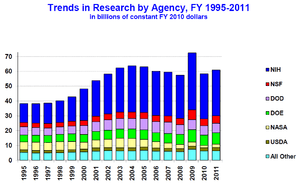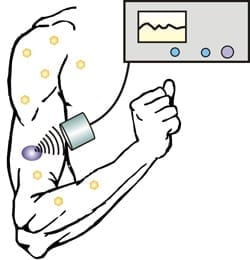
They point to the past decade’s massive investments in cognitive neuroscience as a potential bubble
Fashions in research funding, reward structures in universities and streamlining of scientific agendas undermine traditional academic norms and may result in science bubbles. Research from the University of Copenhagen, which has just been published in the journal Philosophy and Technology, shows how the mechanisms that set off the financial crisis might be replicating in the field of science.
“In finance, the first condition for a bubble occurs when too much liquidity is concentrated on too few assets. The second is the presence of speculators. In science, similarly, if too much research funding is focused on too few research topics, and all researchers speculate in the same fashionable scientific templates to attract funding, a potential science bubble may be forming,” explains professor of Formal Philosophy Vincent F. Hendricks from University of Copenhagen.
In the article “Science Bubbles” just published in Philosophy and Technology, professor Vincent F. Hendricks and postdoc David Budtz Pedersen trace the mechanisms that can result in science bubbles. They point to the past decade’s massive investments in cognitive neuroscience as a potential bubble – culminating with President Obama’s recent endorsement of the one billion dollar Brain Activity Map Project and the European Commission’s 500 million euro Human Brain Project.
“These investments have been preceded by a dramatic rise in fields that attach ‘neuro’ to some human behaviour or trait with promises that the techniques of neuroscience will explain it – and into game-changing explanations of the human mind,” Budtz Pedersen says and adds that studies have shown that peer reviewers and lay citizens are more likely to find explanations of e.g. psychological phenomena more convincing when they contain neuroscientific information, even when it is not relevant to the explanation.
Incentive structures pull researchers in the same direction
Budtz Pedersen and Hendricks show how the ‘breakthroughs’ and’ turning points’ promised by many neuroscience projects – when combined with the fact that recent studies indicate a number of neuroscience publications seem to lack the statistical power to back their findings – have the potential to become a fully-fledged science bubble. In other words: the value of the neuroscientific promises and the investments made in them may turn out to bear no relation to the actual value of the scientific results.
A central cause of this is, according to Budtz Pedersen and Hendricks, the institutional design and incentive structures within science funding and research management, where traditional scientific incentives such as academic capital and reputation are being replaced by monetary incentives and competition.
“Numerous international studies of research management document how many Western universities have set up financial incentives and reward systems to encourage researchers to publish in high-impact journals on popular topics that generate research funding. This means that researchers often will have very little interest in spending time on problems that break away from mainstream or do not lead to publishable results, and they will tend to they dress their research claims up in ways that appeal to policy makers and external evaluators,” Professor Hendricks points out.
Scientific lemmings
The Latest Google Headlines on:
World Wide Web
[google_news title=”” keyword=”World Wide Web” num_posts=”10″ blurb_length=”0″ show_thumb=”left”]
The Latest Bing News on:
World Wide Web
- How RPA vendors aim to remain relevant in a world of AI agentson April 28, 2024 at 6:30 am
If you ask the tech giants, it's agents — driven by generative AI. "However, RPA bots have limitations when it comes to handling complex, creative or dynamic tasks that require natural language ...
- Web O.No: Metaverse and Web 3.0 stunted by internet chaos, warn 87% of business leaderson April 26, 2024 at 1:41 am
Forrit report uncovers the internet is at breaking point, thanks to open source vulnerabilities, siloed web management systems, and poor website governance. LONDON, April 26, 2024 ...
- Tree farmer finds evidence of Wood Wide Web in Ohioon April 25, 2024 at 10:00 pm
An Ohio tree farmer believes he's documented evidence of the existence of the interconnection of forest plants via fungal networks on his property.
- IndiGo places firm order for 30 Airbus A350-900 aircraft, enters wide-body arenaon April 25, 2024 at 8:33 am
IndiGo orders 30 A350-900 aircraft for long haul routes starting deliveries in 2027. The fleet aims to connect Indian metros globally, expanding the n ...
- Veterans Affairs Tech Compliance Boss Chet Frith Talks ‘Leading The World’ In Accessibility In Interviewon April 24, 2024 at 2:34 pm
Chet Frith is director of the VA's 508 Compliance Office. Department of Veterans Affairs . Last August, I published an interview with Dewaine Beard. Beard works for the Department ...
- UnitedHealth says wide swath of patient files may have been taken in Change cyberattackon April 23, 2024 at 8:57 am
UnitedHealth says files with personal information that could cover a “substantial portion of people in America” may have been taken in the cyberattack on its Change Healthcare business.
- Mother trees and socialist forests: is the ‘wood-wide web’ a fantasy?on April 23, 2024 at 2:36 am
In the past 10 years the idea that trees communicate with and look after each other has gained widespread currency. But have these claims outstripped the evidence?
- Web Accessibility Basics: Why Your Website Needs to Be ADA Complianton April 22, 2024 at 10:40 am
Your guide to the best in personal financial products such as credit cards, mortgages, bank accounts, and brokerages.
- Learn about the world’s smallest park on the world’s smallest websiteon April 16, 2024 at 3:43 pm
The smallest park in the world now has a cleverly small website to celebrate it, and that site could get some big recognition. Portland’s Mill Ends Park is in a traffic median on Southwest Naito ...
- Infiltrating ransomware gangs on the dark webon April 14, 2024 at 4:32 pm
Jon DiMaggio, a former intelligence community analyst and current cybersecurity strategist, has used fake personas to communicate with ransomware gangs on the dark web, finding out who's behind them ...
The Latest Google Headlines on:
Contract for the Web
[google_news title=”” keyword=”Contract for the Web” num_posts=”10″ blurb_length=”0″ show_thumb=”left”]
The Latest Bing News on:
Contract for the Web
- Sunday digest: Your weekly roundup of the newson April 28, 2024 at 7:23 am
Two local bookstores got caught up in the excitement of Independent Bookstore Day and offered special events, sales and other perks to shoppers all day Saturday. Bookends & Beginnings and Booked ...
- 'Will they be able to take our home?': This Houston couple got tricked into a contract — to pay up to $67K — for 'free' solar panels. Here are 3 legit ways to get cash back ...on April 28, 2024 at 3:43 am
Bernard and Tasa Mosley, a retired couple from Houston, Texas, learned that lesson the hard way when they fell for a scam offering free solar panels. The budget-conscious pair told KPRC 2 ...
- Teamsters Local 952 keeps membership in the dark as Southern California bus drivers contract expires April 30on April 26, 2024 at 8:30 pm
Teamsters Local 952 members are set to vote on a contract that they have no details on. Teamsters will inform membership of the details and rush a vote after.
- Contract Award: Dataminr Inc. (New York, New York) – $59,354,911on April 25, 2024 at 5:00 pm
Dataminr Inc., New York, New York, has been awarded a $59,354,911 modification (P00009) to previously awarded FA7014-21-C-0024 to exercise Option Year Three for web-based, mobile, e-mail, and ...
- AI Safety for Smart Contracts Is AI Safety for the Worldon April 23, 2024 at 10:04 am
Web3 and blockchain technology go far beyond Bitcoin and NFTs. As businesses become more aware of Web3’s possibilities, one feature will play an important role: smart contracts. Smart contracts ...
- Digital Ally wins new contract to provide 120 body cameras for Arrowhead Stadium's security staffon April 23, 2024 at 4:58 am
The team's director of safety and event security said the Chiefs see the "value of deploying ... body cameras as part of our commitment to creating a safe and positive experience for our fans at GEHA ...
- WEB Aruba Signs Water-as-a-Service® BOOT Agreement With Seven Seas Water Groupon April 19, 2024 at 11:54 pm
VBA will construct a new seawater reverse osmosis plant, contributing a total of a minimum of 16,500 cubic meters of daily drinking water per day.
- Google worker fired for pro-Palestinian protest: “Workers are the ones that have the power to stop the genocide”on April 19, 2024 at 6:50 pm
The WSWS spoke Friday with Zelda, a 23-year-old software engineer, who was arrested and fired by Google for participating in a sit-in to protest the company's complicity in the Gaza genocide.
- The AI-Based Smart Contract Audit Firm ‘Bunzz Audit’ Has Officially Launchedon April 9, 2024 at 11:26 am
Comprehensive security checks are now possible at only 10% of the traditional cost. The price and report creation is 10 times faster and cheaper than traditional firms.
- Dad sought hitman on dark web to kill the parents of 5 children he adopted, feds sayon April 8, 2024 at 3:39 pm
After adopting five children, a man wanted their biological parents dead and arranged for their killings on the dark web, according to federal court documents. In visiting a website “dedicated to ...









